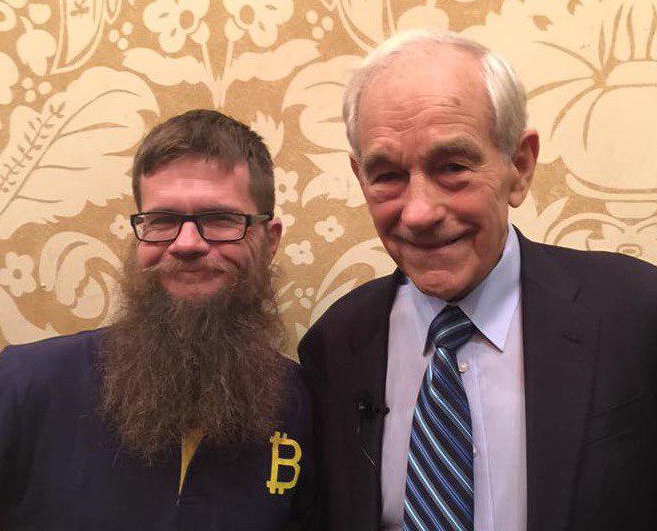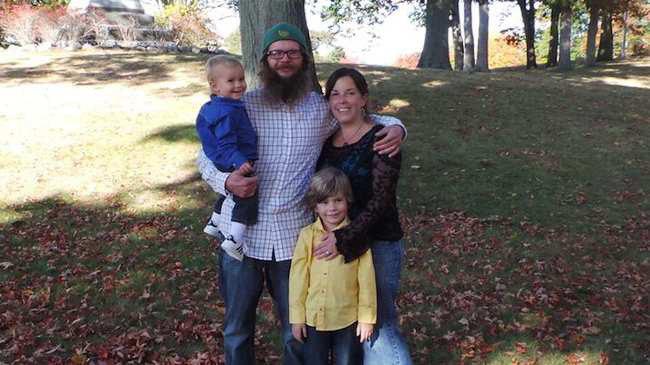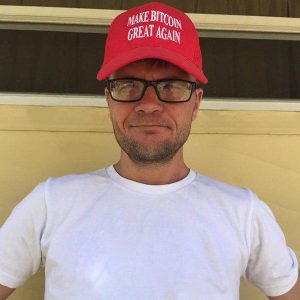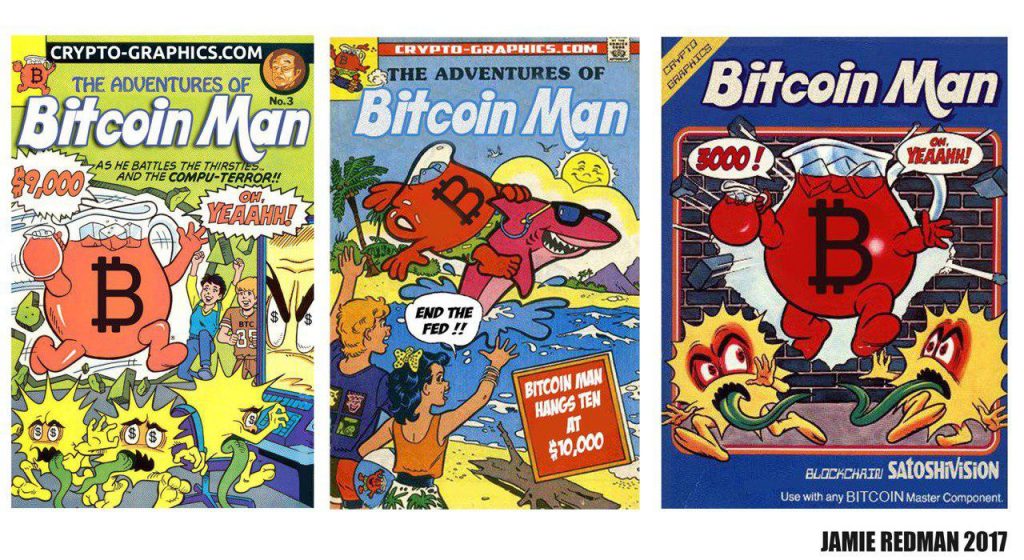Latest news about Bitcoin and all cryptocurrencies. Your daily crypto news habit.

Journalist Jamie Redman is a pioneer. He’s one of the first writers in the world to make his living by covering the cryptocurrency ecosystem. Readers count on his good judgement, perspective, careful study, and nonstop production to give them insight literally no one else can. He’s also the lead writer at news.Bitcoin.com, and is prized by colleagues for his energy and positivity. His work has been published over 2,000 times here at the news desk. The number is impressive for sure, but it is also time to reflect on his body of work, which is a documentation of crypto history itself. Exhaustive, comprehensive, and original – meet the man behind the words.
Also read: The Heroic and Maddening World of Crypto Wallet Recovery
Jamie Redman is Crypto History in the Flesh
News.Bitcoin.com (BC): Tell us a little about your personal journey to bitcoin, crypto. How did you find it?
Jamie Redman (JR): When I first heard about bitcoin it was around 2011. It started when I was frequenting online forums and social media groups that discussed libertarianism, anarchism, and free markets. I asked my wife if she wanted to buy some, and at the time we both had no idea what we were buying. It was only a speculative investment. A month or so later, I began studying and writing about cryptocurrencies every chance I could. I realized that bitcoin would be a revolutionary currency, unlike anything we’ve seen before. So, I wrote a lot about the technology and shared my work with my friends online. I did some videos and writing for the Art of Not Being Governed, and realized I would gear my career towards working within this industry. The biggest thing that astounded me was how big and valuable bitcoin had become without the need of any one person or group, not the state, and in the absence of a corporate entity. I also created a large assortment of memes that I shared as well, and from there I was offered a position at a cryptocurrency news outlet because the CEO really liked my work.
Bitcoin has changed my life and my family’s as well. We have been living off of cryptocurrencies for over three years. The reason for this is because I am extremely passionate about the technology for one main reason – the hope that someday my children’s money will be separated from the state.
 In addition to writing, Jamie Redman is also a graphic artist.
In addition to writing, Jamie Redman is also a graphic artist.
BC: You grew up in New England, right? I remember we discussed your love of music too, and how you traveled in dedication to it. Did those experiences influence how you approach your craft today?
JR: I grew up in Plymouth, Massachusetts, and then a few areas on the South Shore just outside of Boston. When I was 18, I decided to use my graduation money to travel with the jam band Phish instead of going to college right away. I traveled around with Phish for five years selling t-shirts and grilled cheese sandwiches, and basically living in the moment. I think my travels with Phish helped me form my hustle, as I am very proud of how hard I work. That stems from living on the road with just a backpack. That experience inspired my first time to really write, and I started to compose an autobiography about my experiences traveling around the US with Phish-heads. It further provoked me to be less dependent on the state.
 Jamie Redman with Dr. Ron Paul
Jamie Redman with Dr. Ron Paul
Anarcho-Capitalist
BC: Tell us about your personal worldview, your anarchism. How’d you get there?
JR: Phish travels definitely helped, but learning about Dr. Ron Paul in 2008 really sparked my interest in libertarianism. The Occupy Movement also pushed me towards really studying these ideologies with a fine-toothed comb. After Occupy happened I really began researching all types of philosophies and the wide variety of “isms.” Many writings about Austrian economics, objectivism, agorism, relativism, nihilism, mutualism, and even Marxism changed the way I think about the world.
So right now I consider myself an anarcho-capitalist because it seems to fit with the way I think the world should be, but I know that’s not for me to decide. So I think people should try many things, and with true testing and experimentation, society will emulate the best and most efficient practices. Like over time things get worse, but eventually, they do get better after the chaos. These days in my humble opinion, people are free-range slaves with 9-digit numbers and they are allowed to choose an occupation but are forced to pay tax. That’s definitely an improvement from chattel slavery (taking 100% of a person’s labor), but the slavery (taking a percentage of one’s labor) itself still exists. I hope that someday the chains that bind us will be cut and I’m pretty optimistic that they will, but it could be a few more generations away. Innovations like cryptocurrencies, much like the printing press, will help sharpen the blades that cut our current chains. I truly believe that, and it’s why I do what I do.
BC: What are some of the crazier, more memorable stories you’ve covered?
JR: Some of the most memorable stories I’ve covered have been interviewing all kinds of random people within the cryptocurrency space. Some of my most favorite interviews in the past are with people who are actually doing really cool things and not some idolized big wig Bitcoin luminary. Most of those people are pretty boring, but chatting with someone no one knows, who is blind, and learning how they deal with bitcoin transactions and wallets is far more interesting. Most stories like this don’t get as many clicks as when the subject involves idiots like Jamie Dimon, but I think those kind of stories are better. One favorite interview of mine is the Onecoin Buyer Beware interview which went viral all over the world. The article has been translated in multiple languages, and it’s good to expose scams and fake blockchain projects like Bitconnect and Onecoin.
Family Man
BC: What are your thoughts on the current state of the ecosystem, given your perspective?
JR: The state of the cryptocurrency system is still raw, exposed and nascent. I’ve been in the crypto-community for a very long time now, and some people would consider me an “early adopter.” However, I still think it is super early as far as cryptocurrency adoption is concerned, regardless of a coin’s current price and market statistics. So, people just getting into learning about digital assets right now in 2018 are still way ahead of the game.
The current state of the ecosystem to me is like when Windows 95 and personal computers blew people’s minds. Exchanges and wallets need to be more friendly in my opinion, and onboarding people is still a bit difficult, but way easier than when it was back in the early days. But even though I think wallets could be a lot more user-friendly (so my grandma can use them) I say to myself — I wasn’t complaining when I was using dial-up — Because at the time just surfing the net was revolutionary back in the early nineties. That’s how I look at the cryptocurrency space today. It’s so early, and it will be way more advanced 5-10 years from now.
 The Redmans, as photographed for VICE.
The Redmans, as photographed for VICE.
BC: This is a wildcat world you’re in professionally. How do you balance work and family life?
JR: I love my job. I enjoy researching and writing about cryptocurrency solutions and blockchain technology. So because I don’t do a job where I’m stuck in a position where I hate my day-to-day employment, I have a good balance between family life and work. My family sees that I am extremely passionate and happy with what I do, and it pays off with my work production as well. Further, my family and I homeschool our two sons, so with me working from home, all of us are always together. We are a tight bond and live very different lives than most families. Cryptocurrencies are very much a part of our lives and we deal with them on a day-to-day basis. But honestly, with all that said, I have no clue how I balance it all, and I’m cool with that. Bitcoin life is one giant experiment and I accepted those terms the day I jumped into the game.
Do you have a favorite Jamie Redman article? Let us know in the comments below.
Images via Jamie Redman.
Check out Jamie Redman’s author archives. It’s an encyclopedia, a living history of crypto.
Disclaimer
The views and opinions expressed in this article are solely those of the authors and do not reflect the views of Bitcoin Insider. Every investment and trading move involves risk - this is especially true for cryptocurrencies given their volatility. We strongly advise our readers to conduct their own research when making a decision.

